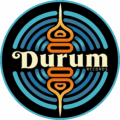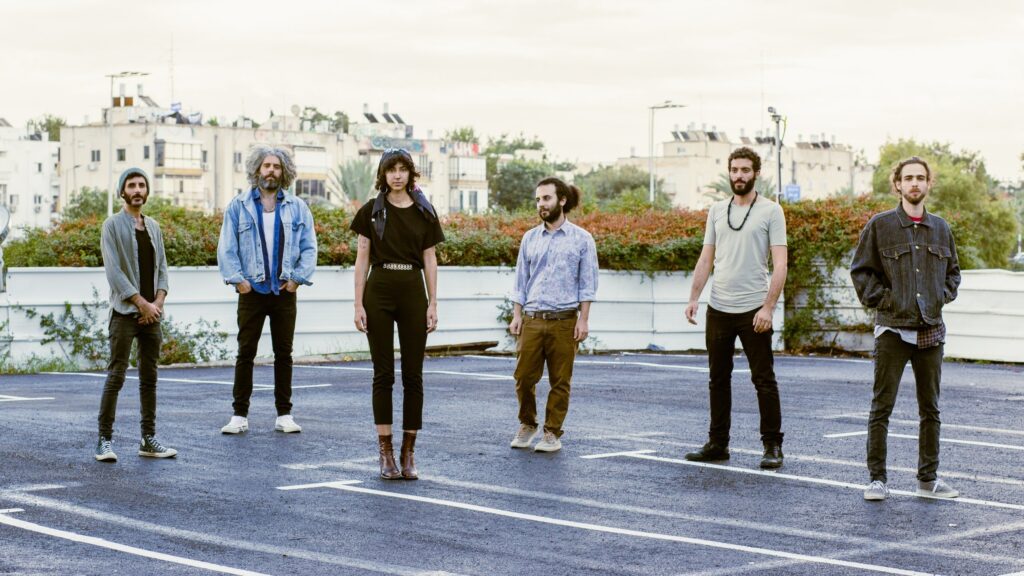Discovered by many through their hypnotic live session on KEXP, Şatellites have quickly carved out a space of their own. Their latest album Aylar, released earlier this year, blends psychedelic guitars, Turkish folk melodies, and disco-fuelled rhythms into a sound that defies genre and still makes you dance. The exact mix shifts from album to album, but the energy is unmistakable. We sat down with the full band to talk about their roots, their creative process, and the kind of live energy that gets even the stiffest European crowds moving.
⸻
Introduction
What does the name ‘Şatellites’ mean?
For some of us it has a meaning, for others it doesn’t. But each of us is in our own sphere, musically and personally like satellites orbiting together. We also wanted a name that subtly hinted at our Turkish influences, so we wanted a Turkish letter in it. Some people pronounce it “satellites,” others “shatelites,” depending on the day or the country we’re in. We like that it flows, has some ambiguity, and sounds a bit spacey. It fits us.
How would you describe your music to someone who’s never heard you before?
We call it Psychedelic Turkish Disco Rock. But we don’t take genres too seriously. We just do what feels right. This is the sentence we use, but the next album might sound completely different. What connects it all is the groove. It’s always danceable.
You released your new album ‘Aylar’ earlier this year, what are those songs about?
Some of our tracks are covers of traditional folk songs, often full of love. But it’s not the happy kind of love. It’s dramatic, like heartbreak. And in the songs of which we write the lyrics ourselves it’s mostly about sex and war… the real stuff. The emotional core is always there, whether the lyrics are old or new.
So, part of the tracks on Aylar are covers?
“Cover” is a bit of a Western term for these kind of tributes. In Eastern traditions, many compositions are public domain. Everybody gets an opportunity to do their take on it. They’re like jazz standards passed on, transformed, and reimagined. So what we do is bring our own sound to traditional songs, with new arrangements and sections. The lyrics often stay true to the original, but musically we take it to a different place.
⸻
Roots
What are the roots of your sound?
We grew up in Israel, which is really a melting pot. It attracts many different cultures, and many different sounds. Turkish music plays a big role in the region, but so does Yemeni, Egyptian, Persian, Greek music… and American rock, of course. Each of us brings in their own background. We were surrounded by this music growing up, at weddings and parties. It’s our vibe, it’s in our blood. But it’s never just one thing, it’s the blend that makes it what it is. We have a genre that’s called ‘Mizrahi music’, it means Eastern music. You really hear the roots in that kind of music, it’s a mix of different cultures..
Are there specific artists that inspired you?
Yes, for sure. Sarit Hadad and lot of the older Eastern Israeli singers from the ’80s. But also Western music like Stevie Wonder, Radiohead and King Gizzard and the Lizard Wizard. Progressive rock, psychedelic stuff. We listen a lot of different music. And if it’s good, we’re into it.
That’s a lot in the mix, what does fusion mean to you as a band?
We have a special connection. When six people from different backgrounds enter a room, it’s often hard to make something harmonious. But for us it’s different, it works. Because there’s chemistry and trust. We don’t always agree, we do compromise and respect each other’s expression. I think that the real magic happens when you just play and let it flow through all the music you’ve absorbed. Whatever comes out of it, comes out.
⸻
Live
And with all those different cultures and backgrounds, do you see yourself building bridges on stage?
Absolutely. We often play to crowds that don’t expect to dance, but we get them to dance all together. Something happens in the show: in the first 10 minutes people are unsure, but then the vibe takes over. We don’t try to be cool or distant. We bring warmth, we smile, we embrace the energy. And the crowd gets that. After 20 minutes, not dancing becomes more awkward than dancing. That’s when you know it’s working and we transfer our energy to the audience. Sometimes people even come to us and thank us for the good vibes.
Is there a live moment that stayed with you?
Woah, so many. But our last show at Cully Jazz Festival in Switzerland in April this year, that was something truly special. We’d just come off a tour, we were totally warmed up. We had to play two shows. They were both packed, about 800 people. But the second show: ‘WOW’. The energy in that room was unforgettable. It felt like a celebration of the music, the crowd was with us. It was amazing, like everything clicked. That’s the kind of moment you never forget.
⸻
Inspires
What’s next for Şatellites?
We’re still talking about it, literally today! The plan is to take 2025 to create new material. And then in 2026, we want to hit the road again, bring it back to the stage. We are currently planning our West-European tour for spring, and hopefully some festivals during summer. Touring, sharing… that’s what we love most.

